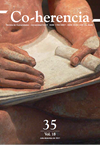COVID-19: Phenomenology of fear and hermeneutics of solidarity in the plague of Athens and in the contemporary pandemic
Main Article Content
Keywords
Phenomenology, Classical Greece, fear, pandemic, plague, mood, virus
Abstract
The main purpose of this article is to conduct an analysis of the current pandemic, attempting to locate basic layers of the phenomenon, in particular, the way its world is structured and the links of coexistence between individuals, taking as thread an element that analytics Heideggerian existentialism highlights as characteristic of man’s way of opening to the world: the emotional temper or affective disposition. To place this element and guide our questions, we will analyze Thucydides’ account of the plague that devastated Athens at the end of the fifth century BC. Starting with Thucydides’ indications, we will move toward the field of existential analytics to discover how worldly relations are defined in connection with the world from his approach. We are interested in showing how this emotional
temper motivates a special transformation of the meaning
of the virus responsible for the current pandemic, a transformation that leads us to consider its mutual (and not only parasitic) nature, which will ultimately and retroactively refer to a better determination of the human existence, as essentially linked to the other, as coexistence.
Downloads
References
Aristóteles (2018). Metafísica [Metaph.] (Intr., trad. y notas de T. Calvo Martínez). Gredos.
Descartes, R. (1989). Sobre los principios de la filosofía (E. López y M. Graña, Trads.). Gredos.
Heidegger, M. (1998). Ser y tiempo (Trad., pról. y notas de J. E. Rivera Cruchaga). Editorial Universitaria.
Hermosa Andújar, A. (2016). ¿Civilización o barbarie? La peste de Atenas o el retorno de la historia a la naturaleza (ensayo sobre Tucídides). Bajo Palabra, (12), 113-126. https://doi.org/10.15366/bp2016.12.009
Homero (2012). Ilíada (Ed. bilingüe de F. Javier Pérez). Abada Editores. Lwoff, A. (1957). The concept of virus. Microbiology, 17(2), 239-253. https://doi.org/10.1099/00221287-17-2-239
Nietzsche, F. (1972). Así habló Zaratustra (A. Sánchez Pascual, Trad.). Alianza.
Pradeu, T. (2016). Mutualistic viruses and the heteronomy of life. Studies in History and Philosophy of Science Part C: Studies in History and Philosophy of Biological and Biomedical Sciences, 59, 80-88. https://doi.org/10.1016/j.shpsc.2016.02.007
Simpson, D. (2019). States of Terror: History, Theory, Literature. The University of Chicago Press.
Thucydide [Th.]. (1973). La guerre du Péloponnèse (J. de Romilly, Trad.). Les Belles Lettres.
Tucídides [Th.]. (2019). Historia de la guerra del Peloponeso [Hist.] (J. J. Torres Esbarranch, Trad.). Gredos.
Zaborowski, R. (2002). La crainte et le courage dans L’Iliade et L’Odisee. Stakroos.





